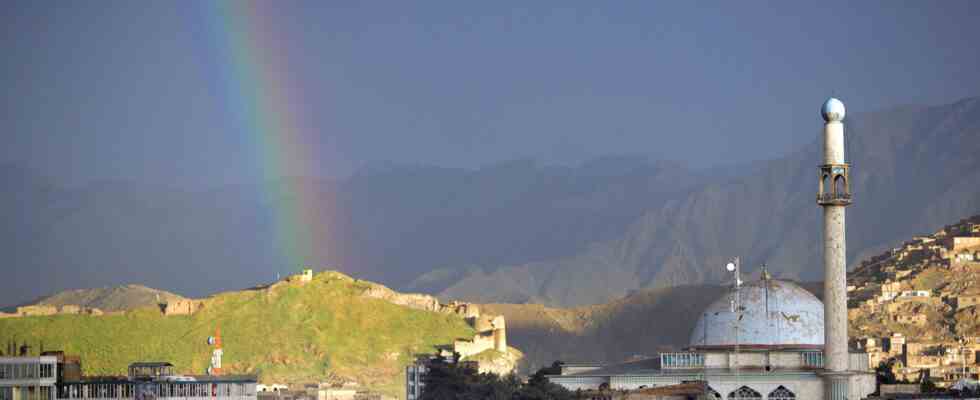Exclusive
Status: 10/21/2022 4:09 p.m
In Afghanistan, the Taliban persecute homosexual and transgender people. These, of all people, have so far hardly had a chance of being accepted into Germany. A new federal government program aims to change that – too late for many.
Ali Tawakoli’s cell phone rings every minute. He types messages, makes calls. The 30-year-old Afghan talks to persecuted homosexuals and transgender people in Afghanistan. You are desperate. A woman on the phone reports that the Taliban are looking for her because she is trans. She’s afraid for her life. “I hear every day that someone has been arrested or tortured. I get messages like this every day,” says Tawakoli. Violence against LGBTIQ+ (lesbian, gay/gay, bisexual, transgender, intersex and queer) has reached a new level.
Ali Tawakoli himself experienced this violence. He was tortured by the Taliban, survived with serious injuries and is one of at least 80 homosexual and transgender activists who, according to the Federal Foreign Office, came to Germany after the Taliban took power. Homosexuals and transgender people have had little or no chance of being accepted. “The federal government has forgotten us,” says the activist.
Criterion: exposure
More than a year ago, when the Taliban took power in Afghanistan, the German government promised quick help. Local staff from the Bundeswehr, other organizations and people who were particularly at risk were allowed to travel on humanitarian visas, including activists like Ali Tawakoli. The criterion was exposure.
So queer people had to be activists at the same time to be eligible for such a visa. “But getting involved or even coming out is impossible for many in Afghanistan. They were even murdered before the Taliban,” he says. According to Ali Tawakoli, many made themselves invisible to protect themselves – and were overlooked by the federal government.
Little chance of a visa
Despite the low chances of those affected getting a visa, he and Jörg Hutter from the queer association Rat und Tat in Bremen have so far submitted 200 applications to the Federal Foreign Office. Altogether there are hundreds of pages, as shown on the laptop. They are horrific images. Men whipped, knifed, or burned by the Taliban.
Neither she nor those affected have received an answer from the Foreign Office. The federal government would have had the opportunity to extend the humanitarian visa to groups such as the queer community, says the lawyer for asylum and human rights, Jens Dieckmann. “In humanitarian catastrophes, Section 22 of the Federal Government’s Residence Act offers the opportunity to politically define groups of people who are granted such a visa because of the special threat situation,” explains Dieckmann.
“I’m very, very angry because I have the feeling that nobody is listening to us – not just now, but for months,” says Tawakoli.
Ministry: Hardly any cancellations
The Federal Foreign Office does not give any reports on the processing status of applications, the ministry writes on request. As a rule, cancellations are not given. It also states that the federal government is aware that public engagement by LGBTI defenders in Afghanistan was very difficult even before the Taliban took power, which is even more the case now.
Organizations and associations such as the LSVD – Lesbian and Gay Association in Germany e. V. have long called for better protection for queer Afghans. “We have repeatedly urged that the criteria of the bridge program be changed, but without success,” says Patrick Dörr from the LSVD. In view of the Taliban’s systematic persecution and extermination of the LGBTI community, “every day of waiting for the new federal admissions program is a day too much,” he emphasizes.
Already many fatalities
Ali Tawakoli says many homosexual and transgender people did not survive the violence at the hands of the Taliban. “Since I’ve been living in Germany, many LGBTI people have died in Afghanistan,” he says. How high the number of those who died is difficult to quantify. Organizations such as Human Rights Watch also report systematic persecution by the Taliban, torture and executions in which gay and transgender people are stoned or buried alive.
More than a year has passed since the fall of Kabul. Only now, this week, has the federal government presented an admissions program that, in addition to politically particularly exposed groups such as human rights activists, journalists or politicians, also takes into account people who “due to their gender, their sexual orientation or gender identity (…) have a special situation experienced or have experienced specific violence or persecution resulting from the individual case,” according to the Federal Ministry of the Interior and the Foreign Office.
The hurdles are high this time too. The applications may only be made by people who live in Afghanistan and only through intermediary partner organizations of the federal government.
help local organizations
This is a pragmatic approach that is understandable in the situation, says human rights lawyer Jens Dieckmann. “If the federal government has partner organizations that are anchored in the region, you have a chance of really reaching out to people who are in need of protection,” says Dieckmann. They could better assess on site how to get people out of the country safely.
The LSVD is critical of the new criteria. People fell out of the grid again, according to the criticism. “Nevertheless, we are glad that the program is finally starting and that the many cases that have already been reported can now be checked,” explains Patrick Doerr. Ali Tawakoli still hopes that at least some will be saved. He wants to continue to do that.

